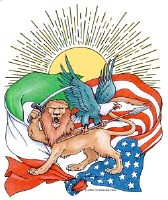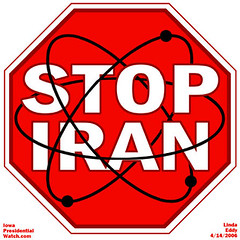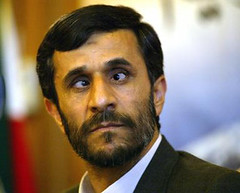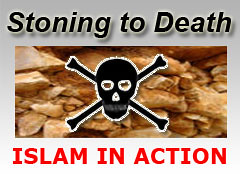Sunday, January 28, 2007
How Democrats Lost Iran and Now Could Lose Iraq
How We Lost Iran
And why we can’t afford another loss in Iraq.
By Dinesh D'Souza and (Annotations in red by Alan Peters)
There are four important Muslim countries in the Middle East: Iran, Iraq, Egypt and Saudi Arabia.
Islamic radicals control Iran, and have since the Khomeini revolution a quarter century ago. Now they have their sights on Iraq.
If they get Iraq, we can be sure they will target Egypt and Saudi Arabia.
Let’s remember that this is a region upon which the United States will continue to be oil-dependent for the foreseeable future. If the Islamic radicals succeed, the American way of life will be seriously threatened.
To understand the high stakes in Iraq, it’s helpful to understand what happened in Iran a generation ago. How did America “lose” Iran, (a closer and stronger ally - under the Shah - perhaps even than Israel) and how can we avoid another debacle in Iraq?
Islamic radicals have been around since the 1920s, but for decades they were outsiders even in the Muslim countries.
(The original Islamic radicals of those days were avid fans of Hitler and his writings and beliefs. Something which still creeps into their "fascist" or purist approach to religion, where all bow to Allah rather than Hitler's Mein Kampf philosophy or "master race").
One of their leading theoreticians, Sayyid Qutb, argued that radical Muslims could not just promulgate theories and have meetings; they must seek to realize the Islamic state “in a concrete form.” What was needed, he wrote, was “to initiate the movement of Islamic revival in some Muslim country.”
Once the radicals controlled a major state, he suggested, they could then use it as a beachhead for launching the takeover of other Muslim countries. The ultimate objective was the unification of the Muslim community into a single Islamic nation, governed by Islamic holy law. (Blanketing the whole globe).
In 1979, Qutb’s goal was achieved when the Ayatollah Khomeini seized power in Iran.
Muslim scholar Hamid Algar terms the Khomeini revolution “the most significant event in contemporary Islamic history.”
It was an event comparable to the French or the Russian revolutions. Virtually no one predicted it, yet it overturned the entire imperial structure and created a new order, even a new way of life.
The mullahs restored the Islamic calendar, abolished Western languages from the schools, instituted an Islamic curriculum, declared a new set of religious holidays, stopped men from wearing ties, required women to cover their heads, changed the banking system to outlaw usury or interest, abolished Western-style criminal and civil laws, and placed the entire society under sharia, or laws based on the Koran.
(Actions emulated by the Pakistani Taleban in Afghanistan. The Taleban are NOT Afghans by nationality and the Afghans repudiate them as being of Afghan origin or nationality. They come from the border regions from inside Pakistan but after some three decades, as brother Pashtun tribesmen, can claim to be whatever nationality they want to be - specially since fanatical Islam recognizes no borders or national divisions).
The importance of the Khomeini revolution is that it demonstrated the viability of the Islamic theocracy in the modern age. Before Khomeini, the prospect of a large Muslim nation being ruled by clergy according to 8th-century precepts would have seemed far-fetched, even preposterous.
Khomeini showed it could be done, and his successors have shown that it can last.
(Albeit, lasting only by executions, torture, oppression and tyranny against the general populace of what was Iran and is now an Islamic Republic, which by its very nature accepts no national identity. The clerics even tried to have the name changed in the United Nations and be called the Islamic Republic but this was rejected).
To this day, post-Khomeini Iran provides a viable model of what the Islamic radicals hope to achieve throughout the Muslim world (and eventually the whole world, as non-Moslem countries are taken over and lose their original identities. This has already begun in Europe and there are schools in Scandinavia where there are no students who are original ethnic Swedes). Khomeini also popularized the idea of the United States as a “great Satan.” Before Khomeini, no Muslim head of state had said this about America.
Muslim leaders like Nasser might have disagreed with the United States, but they never identified it as the primary source of evil on the planet. During the Khomeini era, there were large demonstrations by frenzied Muslims who cursed the United States and burned its flag.
For the first time, banners and posters began to appear all over Iran:
DEATH TO AMERICA! THE GREAT SATAN WILL INCUR GOD’S PUNISHMENT! USA, GO TO HELL! AMERICA IS OUR NO. 1 ENEMY!
These slogans have since become the mantra of Islamic radicalism. Khomeini was also the first Muslim leader in the modern era to advocate violence as a religious duty and to give special place to martyrdom.
Since Khomeini, Islamic radicalism has continued to attract aspiring martyrs ready to confront the Great Satan. In this sense, the seeds of 9/11 were sown a quarter of a century ago when Khomeini and his followers captured the government in Tehran.
Khomeini’s ascent to power was aided by the policies of Jimmy Carter and his allies on the political left. The Carter administration’s own expert on Iran, Gary Sick, provides the details in his memoir “All Fall Down,” a riveting story that has been largely erased from our national memory.
Carter won the presidency in 1976 by stressing his support for human rights. From the time he took office, the left contrasted Carter’s rights doctrine with the Shah’s practices. The left denounced the Shah as a vicious and corrupt dictator, highlighting and in most cases magnifying his misdeeds.
Left-leaning officials such as Secretary of State Cyrus Vance, U.N. envoy Andrew Young and State Department human-rights officer Patricia Derian pressed Carter to sever America’s long-standing alliance with the Shah. Eventually Carter came to agree with his advisers that he could not in good conscience support the Shah.
When the Shah moved to arrest mullahs, who called for his overthrow, (in concert with Soviet driven Tudeh - Communists - and Marxist groups) the United States and Europe denounced his actions.
Former diplomat George Ball called on the U.S. government to curtail the Shah’s exercise of power. Acceding to this pressure, Carter called for the release of political prisoners and warned the Shah not to use force against the demonstrators in the streets. (Carter's own pro-Soviet leanings, which resulted in so many of his actions around the world benefitting Soviet policies were part of this anti-Shah mindset).
When the Shah petitioned the Carter administration to purchase tear gas and riot-control gear, the human-rights office in the State Department held up the request. Some, like State Department official Henry Precht, urged the United States to prepare the way for the Shah to make a “graceful exit” from power.
William Miller, chief of staff on the Senate Intelligence Committee, said the United States had nothing to fear from Khomeini since he would be a progressive force for human rights.
(The State Department, too, which openly states they are there only to talk and negotiate not propose aggressive actions, appear to be pushing to "talk" directly with Iran as if this would provide results any more concrete than the misjudgments of Khomeini in the past.
Is not a description of lunacy that of repeating the same action over and over and expecting a different result?).
U.S. Ambassador William Sullivan even compared Khomeini to Mahatma Gandhi, and Andrew Young termed the ayatollah a “20th-century saint.”
(In their left leaning, blind ignorance, they described Khomeini's future role as that of an Islamic "Pope" who would settle in holy city of Ghom, in Iran, and behave like the Catholic Pope at the Vatican.
As the resistance gained momentum and the Shah’s position weakened, he looked to the U.S. government to help him. Sick reports that the Shah discovered he had many enemies, and few friends, in the Carter administration.
Increasingly stressed, he pleaded with the United States to help him stay in power. Carter refused.
(Read Carter's Illegal Demands on the Shah on my site - link in the left hand column. There was greed, not only stupidity and lack of an understanding of the world balance of power, motivating Carter).
Deprived of his last hope, with the Persian rug pulled out from under him, the Shah decided to abdicate. The Carter administration encouraged him to do so, and the cultural left celebrated his departure. The result, of course, was Khomeini.
The Carter administration’s role in the downfall of the Shah is one of America’s great foreign-policy disasters of the 20th century. In trying to get rid of the bad guy, Carter got the worse guy.
(And thus triggered the Soviet invasion of Afghanistan, since the Shah was no longer there to prevent it as a key player and later gave rise to the 8-year Iran -Iraq war - again because the Shah was no longer there to stop it. A previous time Iraq invaded Iran, the Shah's military sent them scurrying back in a matter of four days and Iraq quickly signed the new border agreement, using the Talweg line (mid-river channel) instead of the long-set British border, which was on Iran's side of the river shoreline separating the countries).
Carter's failure, as former Democratic senator Daniel Patrick Moynihan once said, was the result of being “unable to distinguish between America’s friends and enemies.”
According to Moynihan, the Carter administration had essentially adopted “the enemy’s view of the world.” Carter does not deserve sole discredit for these actions. This intellectual framework that shaped Carter’s misguided strategy was supplied by the political left.
Of course, the primary force behind the Shah’s fall was the fundamentalist movement led by Khomeini. (And heavily bolstered by Soviet backed groups hoping to finally take control of Iran, which years of the monarchy and British oppostion had prevented).
But it is possible that the Shah, with U.S. support, could have defeated this resistance.
A clear example of this comes from when the Shah ordered his Imperial Guards Commander, General Oveissi, to be ready to take over as Prime Minister from Amir Abbas Hoveida the next day. He also called in both the British and American Ambassadors to advise them of this action.
These two men strongly insisted that he should appoint a religious general called Azhari instead. The communist Tudeh party and the clerics, who had turned quiet, expecting a firm reaction, immediately rose up when Azhari went to parliament and prayed with the elected members. A surprising sign of weakness).
Another option would have been for the United States to use its influence to press for democratic elections, an option unattractive both to the Shah (who was already trying out political dress rehearsals along these lines with an unsophisticated population only just enterring the 20th century) and to the Islamic militants (in whose belief structure democracy could have no standing as all allegiance had to be solely to Allah and nobody or nothing else).
Even after the Shah’s departure, a U.S. force could have routed the Khomeini regime – an action that would have been fully justified given Iran’s seizure of the U.S. embassy and the taking of American hostages.
(Increasingly detailed information from Iranian sources who were in charge on the ground at the time and from US military, who were on standby to execute the "clusterf**k" cobbled together hostage rescue attempt compiled by Carter's people, now indicate that there was NEVER a hostage rescue attempt!
The so-called rescue was in fact a cover for another mission gone wrong in the same general geographical area. To avoid having to declare war on the Soviet Union, the failed mission became the plausible "hostage rescue" attempt - which failed but avoided the declaration of war. Avoiding the true mission.
Time permitting, this exclusive story will break on this site in the near future)
Determined at all costs to prevent these outcomes, the left sought not only to demonize the Shah but also to favorably portray Khomeini and his radical cohorts.
In Sick’s words, Khomeini became “the instant darling of the Western media.” The tone of American press coverage can be gleaned from Time’s cover story on Feb. 12, 1979: “Now that the country’s cry for the Ayatollah’s return has been answered, Iranians will surely insist that the revolution live up to its democratic aims.
Khomeini believes that Iran should become a parliamentary democracy. (Carter forgot to tell Khomeini this was to be his belief, since Khomeini never had this in mind - as proved by his writings on religious jurisprudence and his response to what should be done about the Ministry of Justice. He replied: "if someone is against me, he is against Allah and should be killed on the spot. Why do I need a Ministry of Justice or any other justice?"
Carter and other liberals opined those who know the ayatollah expect that eventually he will settle in the holy city of Qom and resume a life of teaching and prayer.”
Immediately following Khomeini’s seizure of power, political scientist Richard Falk wrote in the Feb. 16, 1979, New York Times, “To suppose that Ayatollah Khomeini is dissembling seems almost beyond belief. He has been depicted in a manner calculated to frighten. The depiction of him as fanatical, reactionary and the bearer of crude prejudices seems certainly and happily false.
His close advisers are uniformly composed of moderate, progressive individuals ... who share a notable record of concern with human rights. What is distinctive about his vision is the concern with resisting oppression and promoting social justice. (These moderate advisors became the most virulent and blood thirsty executioners almost immediately).
Many non-religious Iranians talk of this period as Islam’s finest hour. Iran may yet provide us with a desperately needed model of humane governance for a Third World country.” The naiveté of Falk’s essay is of such magnitude as to be almost unbelievable.
Falk should have known better, and I believe he did know better. Sick notes that in terms of the kind of regime he wanted to institute in Iran, “Khomeini was remarkably candid in describing his objectives.” As an expert on international relations, Falk was surely familiar with what Khomeini had been consistently saying for three decades.
Along with Ramsey Clark, former attorney general in the Johnson administration, Falk met with Khomeini on his last day in Paris, before his triumphal return to Iran. Shortly after that meeting Clark conducted a press conference to champion Khomeini’s cause. Falk, too, seems to have acted as a kind of unpaid public-relations agent for the ayatollah’s regime.
Upon consolidating his power, Khomeini launched a bloody campaign of wiping out his political opposition and reversing the liberties extended by the Shah to student groups, women’s groups and religious minorities.
In one year, the Khomeini revolution killed more people than the Shah had executed during his entire quarter-century reign.
Despite the fact that many progressive figures were imprisoned, tortured and executed, Khomeini’s actions produced a great yawn of indifference from America’s cultural left. The same people who were shocked and outraged by the crimes of the Shah showed no comparable outrage at the greater crimes of Khomeini.
They knew, as well as everyone else, that liberty would be largely extinguished in Iran, and they greeted this prospect with equanimity.
Even when radical students overran the U.S. Embassy in Tehran on Nov. 4, 1979, and took more than 60 American hostages, the left’s sympathy was with the hostage-takers.
During this period, three liberal clergymen – William Sloane Coffin of New York’s Riverside Church, National Council of Churches executive director William Howard and Catholic Bishop Thomas Gumbleton – visited the hostages and looked with approval as they recorded anti-U.S. statements for use as Iranian propaganda.
The U.S. religious leaders did not seem embarrassed to be used by the Iranian hostage-takers. Many of the allegations against the United States launched by the Iranian radicals corresponded exactly with the views of these liberal clergymen.
(Today, a highly similar situation exists with a hand-in-hand set of viewpoints expressed by Al Qaeda, which parrot the leftist liberals of the USA and the Democratic party now again in power. To an extent that Al Qaeda took credit for getting these "anti-Bush at any cost" legislators back into power).
Going beyond the expectations of the hostage-takers, Coffin even faulted his fellow Americans for “self pity” and urged them to hold hands with their captors and sing.
In the hostage crisis, these clergymen quite consciously contributed to America’s humiliation.
By aiding the Shah’s ouster and with Khomeini’s consolidation of power, the left collaborated in giving radical Islam its greatest victory in the modern era. Thanks in part to Jimmy Carter, Muslim radicals got what they had been seeking for a long time: control of a major Islamic state.
Now, irony of ironies, Carter and some of the same people who lost Iran are back in the news, criticizing the Bush administration for what it is doing in Iraq. Some of their points may be valid, but once again, they are forgetting that when you try and get rid of something terrible, you should at least make sure that you don’t get something even more terrible.
Carter never understood that, and he still doesn’t. (Nor does the newly elected U.S. House and Senate).
Rather than dispensing advice, the 39th president should be offering the United States an apology.
Yes, what’s going on in Iraq today is not pretty, but that could be said of just about any war. In trying to escape from a difficult situation, America should not put itself into an even more perilous situation. We should always keep in mind what’s at stake in this conflict. (Not what some distant past military, mid-level officer, with political Committee chairmanship ambitions proposed. Which make Carter appear to be wise by comparison).
Today in Iraq, the Islamic radicals are after their second big prize. Iraq is, in a sense, even more important to the radicals than Iran. The reason is that the Khomeini Revolution, despite its global aspirations, proved to be very difficult to export.
Iranians are Persian, and thus ethnically distinct from the Arabs who dominate the Middle East. Even within Islam, Iranians belong to the Shia minority, while 80 percent of Muslims worldwide are Sunni.
Consequently, Islamic radicals have been attempting for the better part of two decades now to carry the revolution beyond Iran, to bring a second Muslim state under radical control, and to establish a model for theocracy and terrorism that the Sunni majority in the Islamic world can emulate.
So, unlike in Vietnam, the United States faces an adversary that is not merely ideologically hostile, but one whose success would threaten our vital interests and our security, as well as our economic well-being.
Given this, the insouciance and even anticipation with which some of the Bush administration’s critics propose prompt U.S. withdrawal from Iraq is remarkable. (Liberal Democrats, back in power appear to be insisting on repeating Carter's irreparable mistakes - cutting off their noses to spite their face).
In a recent article in Harper’s, former presidential candidate George McGovern proposed that the United States get out of Iraq, give up its bases there, apologize for having invaded in the first place, accept responsibility for any bloodbath that ensues, and offer to pay reparations to Iraq for its war crimes.
This advice goes beyond recklessness. What do McGovern and his allies think is going to happen when U.S. troops leave?
They seem eerily eager for the insurgents to topple the elected government and seize power. Apparently their dislike for President Bush is great enough that they are willing to risk the country falling into the hands of Islamic radicals.
(And consequently - similarly to regional events triggered by the removal of the Shah, to have those Islamic extremists operating their deadly missions inside the USA, suicide or homicide bombing our malls and mostly unprotected and impossible to protect infrastructure).
Little do the people waging “the war against the war” know that, in exchange for a temporary political advantage, they are gravely endangering America’s security and well-being, ultimately even their own.
Like Carter and his liberals, they will be to blame for the pain and suffering which will make the minimal deaths - by comparison - in Iraq of US soldiers - look like a walk in the park to the civilian bodies that will be strewn about in our cities. The Islamic perpetrators are already in place here and as France discovered, they cannot be appeased. Nor as liberals in England discovered, will sypathetic legislation prevent subway or airline attacks. Successful or otherwise.
Here in the USA, with liberals again blocking or impeding government efforts to intercept and prevent attacks through NSA phone taps, bank overview or other methods, our people are being put in to ever graver danger in the name of freedoms the enemy will never allow us to have but will eagerly abuse to get us.
Adapted from Dinesh D’Souza’s new book, “The Enemy at Home: The Cultural Left and Its Responsibility for 9/11” (Doubleday). D’Souza is the Rishwain Fellow at the Hoover Institution at Stanford University.
Subscribe to:
Post Comments (Atom)














1 comment:
Must read history!! Great!
Post a Comment